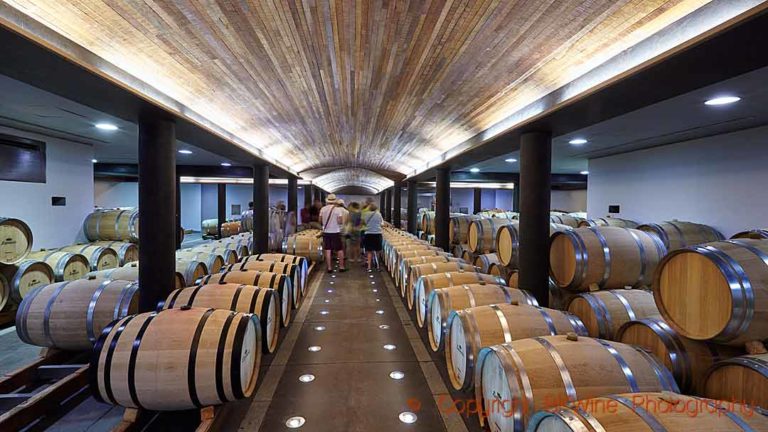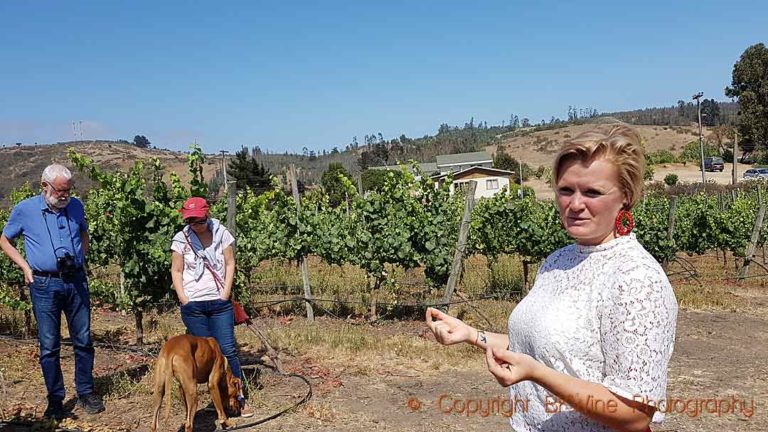Carmenère is originally a Bordeaux grape. It still is, but the area in Bordeaux today is tiny. The grape ripens poorly in Bordeaux, it is believed. Perhaps it is about to make a cautious comeback now that the climate is getting warmer. However, carmenère thrives on the other side of the globe in the Chilean vineyards.
The Chileans have adopted carmenère and made it their very own grape variety. Carmenère is an important symbol of the Chilean wine industry even though it is only planted on 11,000 hectares compared to over 40,000 ha for cabernet sauvignon.
Carmenère can be a bit tricky, though. You must treat it right in the vineyard to get the perfect balance between a refreshing “green” character and a dense structure. The producers say you should harvest late and ensure the grapes get a lot of sun. More and more Chilean prestige wines (in Chile, often called “icon wines”) are made from carmenère, which thus shows that it can hold its own against cabernet sauvignon.
One of the best carmenère I have tasted is from Viña Maquis in the Colchagua Valley of Chile, a wine region known for its red wines, about 200 kilometres south of Santiago. Their Maquis Viola is a magnificent wine made from the best carmenère grapes on the estate and a touch of cabernet franc.
Viña Maquis has a unique location between two rivers. This plays a significant role in Viña Maqui’s wines. We meet Ricardo Rivadeneira Hurtado, owner and CEO of Viña Maquis, out in the vineyard and he describes the phenomenal location of the estate. “The river breeze protects perfectly from frost damage,” he says.
His grandfather planted vines here 53 years ago, thinking they would do well because of the rivers and the lower temperature. “And he did pick a good spot,” says Ricardo. Our wines always have moderate alcohol levels and very fresh fruit. The acidity is always natural; we don’t need to adjust.”
The soil is alluvial, which is common in Chile. “If you dig a soil pit, you’ll find gravel at some depth,” says Ricardo. “The gravel gives good drainage at big rains. The gravel is mixed with clay rich in nutrients and the key to quality and good water-holding capacity. The clay stores water, like a water reservoir, and gives to the plants little by little. This soil gives small, flavourful, and concentrated grapes.”
The rivers also help Viña Maquis to work sustainably. Maquis was a pioneer in Chile and one of the first to be certified sustainable. “Wines of Chile is pushing the producers to be certified,” says Ricardo.” Some see sustainability as something vague, but I like it.”
“Near the river, there is a lot of life, birds, insects, native trees… It is a biological corridor. This diversity helps; there is no need to spray. The rivers are at a lower level than the vineyards, so the excess water runs off to the rivers when it rains. Some of our vineyards are dry-farmed.”
Tasting some wines from Viña Maquis
Viña Maquis Gran Reserva Rosé, Colchagua, Chile
“I love this rosé,” declares Ricardo, and I agree; it is delicious. It is made from 75 % malbec and the rest cabernet franc, grown in the freshest sectors of Maquis’ vineyard. It has a lovely mouthfeel, an intense, flavourful, and silky palate, and a long, fresh finish. A bit of oak ageing gives it a nice body.
Viña Maquis Lien 2018, Colchagua, Chile
Lien was first made in 2003 and was their first wine and, in fact, the only wine until 2008. The main grapes are always cabernet franc and carmenère supplemented by petit verdot, malbec and cabernet sauvignon depending on the vintage. ”2018”, says Ricardo, “was an amazing vintage, a lot of sun but no heatwaves.” Intense, well-structured, superb aromas of fennel and red fruit. 18 months in oak.
The range has since been expanded. It was their consultant at the time, Jacques Boissenot from Bordeaux, who persuaded the Hurtado family to start producing more wines, and among them, Maquis Viola.
Viña Maquis Viola 2015, Colchagua, Chile
Viola has the best carmenère grapes and 12% of its best cabernet franc. It is a delicious and enjoyable wine. It is very flavourful, with a dense structure and smooth and silky fruit. The aftertaste is very long.
“Cabernet franc, says Ricardo, “adds backbone; these two grapes get along very well. Our carmenère gives no bell pepper character; it has always been floral.”
Viña Maquis Franco, Cabernet Franc 2014, Colchagua, Chile
Another superb wine from Viña Maquis is their cabernet franc. It is exquisite, with layers of aromas, a good tannin structure, some tobacco aromas, and lots of fruit. It’s pretty typical of the grape.
It is easier to find a good spot for cabernet sauvignon than for cabernet franc, says Ricardo. “Cabernet franc loves clay, but clay is tricky and can give it green aromas. Here, with clay on gravel and good drainage, we get good wines!”
See many more images from Viña Maquis below!
The Viña Maquis Viola goes excellently with a juicy côte de veau:
























